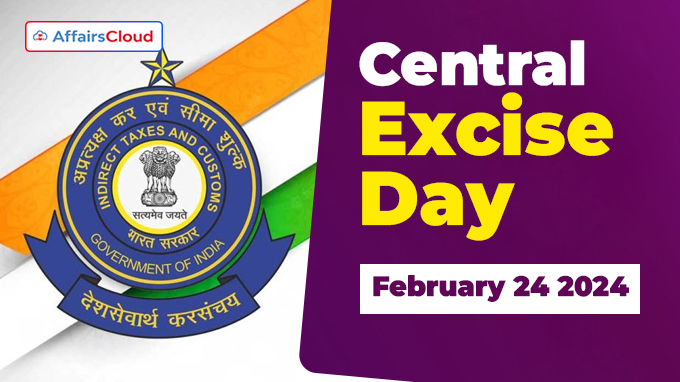 The Central Excise Day is annually observed across India on 24 February to recognise and highlight the contributions of the Central Board of Indirect Taxes and Customs (CBIC), which is responsible for administering indirect taxes in India.
The Central Excise Day is annually observed across India on 24 February to recognise and highlight the contributions of the Central Board of Indirect Taxes and Customs (CBIC), which is responsible for administering indirect taxes in India.
- The day also commemorates the anniversary of the enactment of the Central Excise and Salt Act, 1944 on 24 February 1944.
Objective: To encourage the employees of the excise department to effectively perform their duties throughout India with an aim to prevent corruption in the goods manufacturing business.
- It also aims to implement other rules to carry out the best possible excise services.
What is Central Excise Duty?
i.Central Excise Duty is an indirect tax imposed and collected by the Central Government on the goods produced and consumed in India.
- Each person, rich or poor, is liable to pay tax indirectly on the purchase of goods that have already been charged to duty.
ii.This tax is administered under the authority of Entry 84 of the Union List of the Seventh Schedule read with Article 226 of the Constitution of India.
iii.This indirect taxation is administered through an enactment of the Central Government viz., The Central Excise Act, 1944, and connected Rules.
Note: Commodities liable to central excise duties were listed in the Schedule to the Central Excise Tariff Act, 1985 (Act 5 of 1986) which came into effect on 2 February 1986.
Central Excise and Salt Act, 1944:
i.Central Excise and Salt Act, 1944 was the first law to impose excise duties on goods and services produced or manufactured in India.
ii.It was passed consolidating the various enactments on the subject and imposing new duties on coffee, tea, and betel nut.
iii.In 1966, the act was renamed The Central Excise Act 1944. Schedules 1 and 2 of the act were related to the values and rates of the duties.
CBIC:
i.CBIC (erstwhile Central Board of Excise and Customs (CBEC)) is administered by the Department of Revenue, Ministry of Finance, and oversees various field offices (Central Excise Commissionerates) across India.
ii.The department of CBIC has been established to make and implement policies related to the tax payable and its collection by the people all through India.
Operations:
i.Physical Control Process: Specifically implemented for cigarettes, this process involves a thorough evaluation by Central Excise officers for approval.
ii.Self Removal Process: The self-removal process has been implemented to manage the central excise duty of all other goods manufactured throughout India.
- It empowers manufacturers to self-assess legal responsibilities for clearing goods.
Preventing Unlawful Practices:
Customs and Central Excise Duties have been implemented to curb negative business practices like smuggling, these duties contribute significantly to managing central excise, customs, and narcotics issues in India.
About Central Board of Indirect Taxes & Customs (CBIC):
It is the administrative authority for its subordinate organizations, including Custom Houses, Central Excise and Central Goods and Service Tax (GST) Commissionerates, and the Central Revenues Control Laboratory.
Chairman– Sanjay Kumar Agarwal
Headquarters– New Delhi, Delhi
Motto– “Desh Sevarth Kar Sanchay” Tax collection in Service of the Nation




